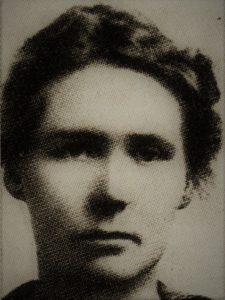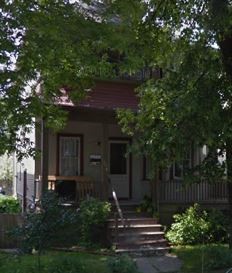The Icelandic literary tradition followed the emigrants west, poets born in Iceland found their voice in the West and had the opportunity to write. Poems, short stories and novels were published and were usually very popular. At gatherings, recollections were conveyed, and usually in a colloquial language well into the 20th century. Hardly a copy of the Icelandic weekly or magazine was published without a poem or a short story. Women as much as men wrote poems and stories, one such was Guðrún H. Finnsdóttir. Her friend Richard Beck, editor of Ólaf Þorgeirsson’s Almanak in Winnipeg, wrote an obituary about her which was published in Almanak 1947.

Guðrún H. Finnsdóttir Photo: VÍÆ1
Poetess Guðrún H. Finnsdóttir: “In the year that is about to end when this is written, the Icelandic nation was to see three women poets leave them, Hulda (Unna Benediktsdóttir Bjarklind), Guðfinna Jónsdóttir from Hömrum and Guðrún H. Finnsdóttir. (Mrs. Gísli Jónsson). There is great regret for all of them, because all of them had greatly enriched our literature, each in their own field. The sudden death of Guðrún H. Finnsdóttir, who touches us Western Icelanders, who love literature, the most, died at her home in Winnipeg on March 25, 1946, because she was both one of the most remarkable and talented women in our group and had, with her short stories, brought up insightful understanding and thoughtful pictures of the life and struggle of Icelandic men and women in this country; those stories of hers had also deservedly won her widespread popularity on both sides of the ocean. The poetess Guðrún was an Eastern Icelander, born near Geirólfsstaðir in Skriðdal on February 6, 1884. Her parents were Finnur F. Björnsson and Bergþóra Helgadóttir, who lived in the mentioned area, a respected couple. In 1902, Guðrún married her surviving husband, Gísli Jónsson, a poet and editor from Háreksstaðir in Jökuldalsheiði, and they moved west across the ocean to Winnipeg in 1904 and had lived there since then. They had five children, one daughter, Unna by name, the oldest child, died in childhood, but the others who survived are Helgi, Dr. Phil. and Professor of Geology at Rutgers University in New Brunswick in the State of New Jersey, a distinguished scientist; Mrs. Bergthóra Robson in Montreal, Mrs. Gyða Hurst and Mrs. Ragna St. John, both of Winnipeg. All of these children are the most promising and splendidly gifted, as they should be, and well educated because their parents assisted them in university studies; there, as in many other things, is the obvious cultural interest of Gísli and Guðrún and their love for all beautiful things, but it was a lot to take on financially. Guðrún H. Finnsdóttir was an active housewife and at the same time a wonderfully loving and caring housewife and also a wonderfully loving and caring wife and mother, and that was in full accordance with her solid and pure temperament. The domestic life of the couple also had the most beautiful harmony; they were both unusually talented and artistic, he a fine singer and poet, while she a magnificent storyteller, which will be further described. They also had other things in common, ideals and concerns; adored beauty, freedom and progress, not to mention their deep-seated love of Icelandic cultural heritage, our language, history and literature. Into the atmosphere that reigned in their home, it was refreshing and ennobling to come: when their warm and pure Icelandic hospitality was added, it is no wonder that the many guests who were brought to the garden there have fond memories of it. The person who is writing this is one of that large group of friends, and considers himself lucky to have enjoyed the loyal friendship of the couple for years and their wholehearted support in the work for common interests. Guðrún H. Finnsdóttir was, as mentioned earlier, a highly capable woman and excellently pure-hearted, friendly with different people; she possessed in abundance the honesty of mind, the spirit of humanity and nobleness that have characterized true Icelandic men and women generation after generation. In other words, she was very Nordic in temperament, in the best sense. She is described well and correctly in these comments by Einar P. Jónsson, poet and editor, her brother-in-law.”
English version by Thor group.

906 Banning St. in Winnipeg. They lived here a long time. Photo: JÞ
